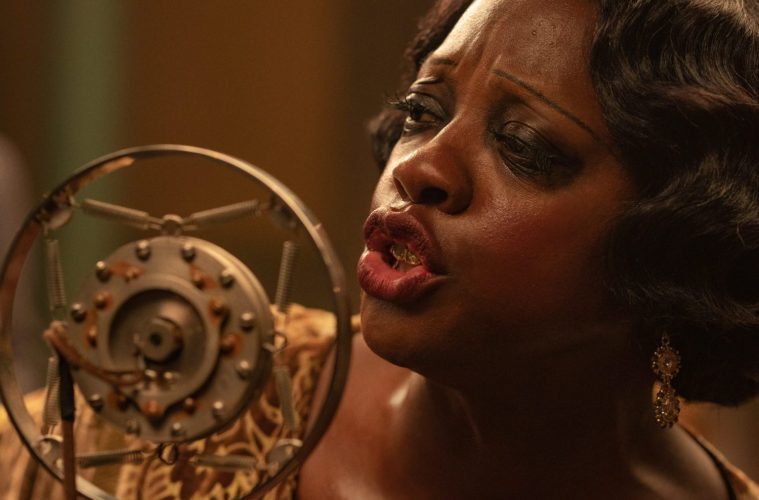When I saw actor-director Denzel Washington’s film of August Wilson’s play Fences in a Valley movie theater in December 2016, I shut my eyes for a time so that I could simply listen to the thrillingly rich dialogue. Wilson, who died in 2005 at age 60, wrote language so dense with alliteration and emotion that hearing it spoken by gifted actors can be an exalting experience. Still, I worried that those around me weren’t quite hearing it. At a play, we listen closely to language, but at the movies, movement and image distract. We watch and appreciate great film performances but maybe we don’t always hear them.
You’ll surely be spellbound by every word and gesture of the extraordinary ensemble in Ma Rainey’s Black Bottom, theater director George C. Wolfe’s film version (produced by Washington) of Wilson’s 1984 play. In adapting the play, Wolfe and screenwriter Ruben Santiago-Hudson (Lackawanna Blues) have slightly expanded the settings and added a potent locked door metaphor while tightening the monologues. Less time with Wilson’s wonderfully verbose characters is never the first choice but at a lean 95 minutes, the film is sure to hold the attention of its homebound audience.
In his final performance, the late Chadwick Boseman is Levee, a rebellious young trumpet player in the band of (Gertrude) Ma Rainey, a legendary blues singer played by Viola Davis. It’s 1927 and Ma is late for a recording session in Chicago. Her band gets there first and sets up in a desolate basement room and though they’re meant to be rehearsing, the four men mostly banter, argue and tell stories, including the one about the Black man who sold his soul to the Devil and more wrenchingly, Levee’s painful remembrance of his mother being assaulted by white men when he was eight.
A group of men sitting around trading stories filled with both laughter and anguish is a Wilson trademark but if you listen closely, you’ll hear his gift for infusing that talk with powerful ideas — the job of a good playwright. Playing an absent-minded tune, the pianist Cutler (Glynn Turman) offers a cooking analogy for the Black experience in the “stew” that was the building of America. “The colored man,” he declares, “is the leftovers. Now, what’s the colored man going to do with himself? That’s what we’re waiting to find out. But first, we gotta know we the leftovers. Now, who knows that?”
Ma knows, and pushes against the knowledge with every breath. She’s late to the session because she wants to make her unctuous white manager (Jeremy Shamos) work harder for concessions from the tight-fisted studio owner (Jonny Coyne) and because she knows that the moment before she sings — when they still need her — is the only time she has power. “They don’t care nothin’ about me,” she tells her band leader, Cutler (Colman Domingo), and the deep well of interior knowledge Davis brings to that line, and the brief, ferocious speech that follows, is breath-taking.
Levee is too young and too brash to have developed Ma’s instinct for survival in this studio and the world outside its doors. He’s his own man, he proclaims, who fears no one, not even the god his band mates extol. As the day wears on and Levee is worn down by disappointment and self-recrimination, he erupts against God in a Heaven-directed taunt Boseman delivers with a fury, ache and artistry that would ring out across time in the theater. In the exquisite intimacy of film, he wounds one’s heart and steals a part of it forever.
Advertising disclosure: We may receive compensation for some of the links in our stories. Thank you for supporting Irvine Weekly and our advertisers.

